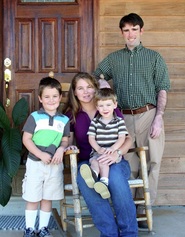About Alexander

Family picture from September 2010
As young teenagers, Alexander and I met at 4-H Horse Camp. Our friendship continued as we would see each other throughout the years at horse shows and each summer at camp. We both attended college at the University of Georgia, the rest, as they say, is history.
While in college, Alexander was diagnosed with Autoimmune Hepatitis type 1 (this started with a late-night trip to the ER, but looking back had probably been going undiagnosed since he was a teenager). Patients with Autoimmune Hepatitis are generally thought to be “predisposed” to having it. The active condition is usually triggered by a virus, medication or environmental factors. Alexander’s gastroenterologist suggested further testing at the Mayo Clinic in Jacksonville, Fl. This revealed that he also had Primary Sclerosing Cholangitis (PSC) that causes a narrowing of the bile ducts both inside and outside of the liver. Following this, he was further diagnosed with Ulcerative Colitis. This was all ten years ago, and until now many of our friends and co-workers had no idea he was sick – because he doesn’t complain or want to “bother” anyone.
Alexander and I married after college and have two little boys. For five years we had a feed and tack shop in Athens, Ga. In 2009 we closed the retail part of Classic Feed & Saddlery, but have continued our horse blanket laundry and repair service (www.cleanblankets.weebly.com – quick plug for it!). Since then, Alexander has battled complications from these diseases all while working and helping raise our boys.
In September 2010 I took him to the doctor after it seemed as if he had a virus that was lingering for several days. When he collapsed in the doctor’s office we were sent straight to the hospital. In 2009 he spent 11 days in the hospital, but this time he was admitted three times in 30 days – with a total of 25 days at the hospital. During the first of his three stays, it was determined that he had a bleeding varices and his liver condition was worsening. Because of this he was referred to the transplant clinic at Piedmont Hospital.
Piedmont has been very thorough in their evaluation of Alexander’s condition and full of information. One of the resources they provide is access to the Georgia Transplant Foundation. Through grants and fundraisers, GTF is able to offer “Access to Care” accounts for patients to save for their transplant and anti-rejection medications. During the first year the account is open, GTF will match our deposits up to $10,000. The yearly costs of anti-rejection medications can reach up to $32,000, so this is a program we defiantly want to utilize. While our health insurance covers a good amount of Alexander’s medical expenses, we have seen how quickly all the medical bills can accumulate.
When our friends started offering to help us raise money for the transplant fund, the idea of this auction was formed. We have been amazed and overwhelmed by the generosity shown to us through donations of auction items, services and people’s time.
Sincerely,
Sherry Abrams
If you would like to learn more about autoimmune hepatitis or primary sclerosing cholangitis (PSC) the National Digestive Diseases Information Clearinghouse (NDDIC - http://digestive.niddk.nih.gov) has complete, accurate information.
Other things you can do to support Alexander and others in need of organ transplants
Donate your blood or time to the American Red Cross (www.redcross.org)
Sign up to be an organ donor - learn how at www.organdonor.gov
Learn more about organ transplants at the United Network of Organ Sharing site (www.unos.org)
Support the Georgia Transplant Foundation (http://www.gatransplant.org/)
While in college, Alexander was diagnosed with Autoimmune Hepatitis type 1 (this started with a late-night trip to the ER, but looking back had probably been going undiagnosed since he was a teenager). Patients with Autoimmune Hepatitis are generally thought to be “predisposed” to having it. The active condition is usually triggered by a virus, medication or environmental factors. Alexander’s gastroenterologist suggested further testing at the Mayo Clinic in Jacksonville, Fl. This revealed that he also had Primary Sclerosing Cholangitis (PSC) that causes a narrowing of the bile ducts both inside and outside of the liver. Following this, he was further diagnosed with Ulcerative Colitis. This was all ten years ago, and until now many of our friends and co-workers had no idea he was sick – because he doesn’t complain or want to “bother” anyone.
Alexander and I married after college and have two little boys. For five years we had a feed and tack shop in Athens, Ga. In 2009 we closed the retail part of Classic Feed & Saddlery, but have continued our horse blanket laundry and repair service (www.cleanblankets.weebly.com – quick plug for it!). Since then, Alexander has battled complications from these diseases all while working and helping raise our boys.
In September 2010 I took him to the doctor after it seemed as if he had a virus that was lingering for several days. When he collapsed in the doctor’s office we were sent straight to the hospital. In 2009 he spent 11 days in the hospital, but this time he was admitted three times in 30 days – with a total of 25 days at the hospital. During the first of his three stays, it was determined that he had a bleeding varices and his liver condition was worsening. Because of this he was referred to the transplant clinic at Piedmont Hospital.
Piedmont has been very thorough in their evaluation of Alexander’s condition and full of information. One of the resources they provide is access to the Georgia Transplant Foundation. Through grants and fundraisers, GTF is able to offer “Access to Care” accounts for patients to save for their transplant and anti-rejection medications. During the first year the account is open, GTF will match our deposits up to $10,000. The yearly costs of anti-rejection medications can reach up to $32,000, so this is a program we defiantly want to utilize. While our health insurance covers a good amount of Alexander’s medical expenses, we have seen how quickly all the medical bills can accumulate.
When our friends started offering to help us raise money for the transplant fund, the idea of this auction was formed. We have been amazed and overwhelmed by the generosity shown to us through donations of auction items, services and people’s time.
Sincerely,
Sherry Abrams
If you would like to learn more about autoimmune hepatitis or primary sclerosing cholangitis (PSC) the National Digestive Diseases Information Clearinghouse (NDDIC - http://digestive.niddk.nih.gov) has complete, accurate information.
Other things you can do to support Alexander and others in need of organ transplants
Donate your blood or time to the American Red Cross (www.redcross.org)
Sign up to be an organ donor - learn how at www.organdonor.gov
Learn more about organ transplants at the United Network of Organ Sharing site (www.unos.org)
Support the Georgia Transplant Foundation (http://www.gatransplant.org/)

